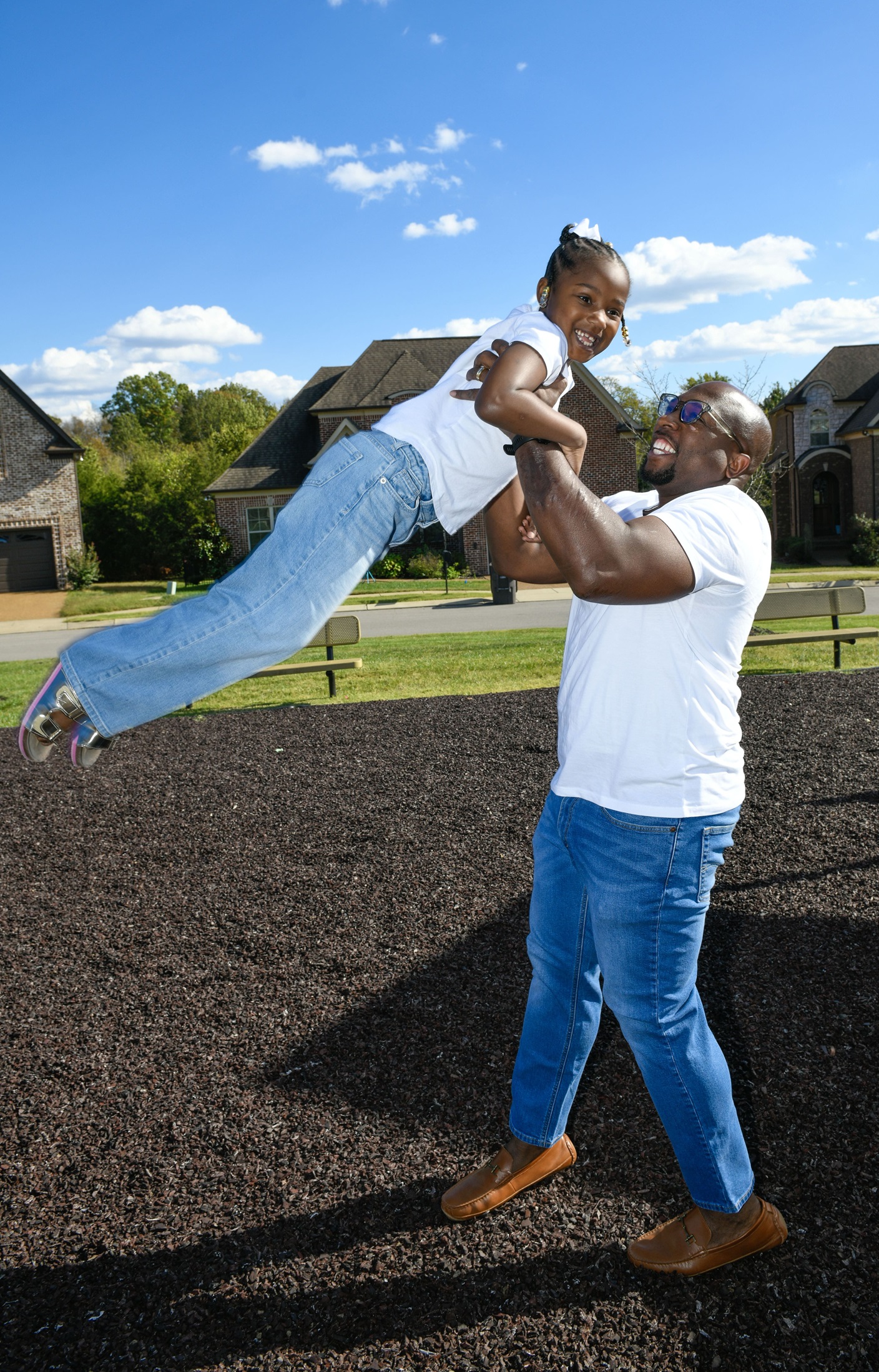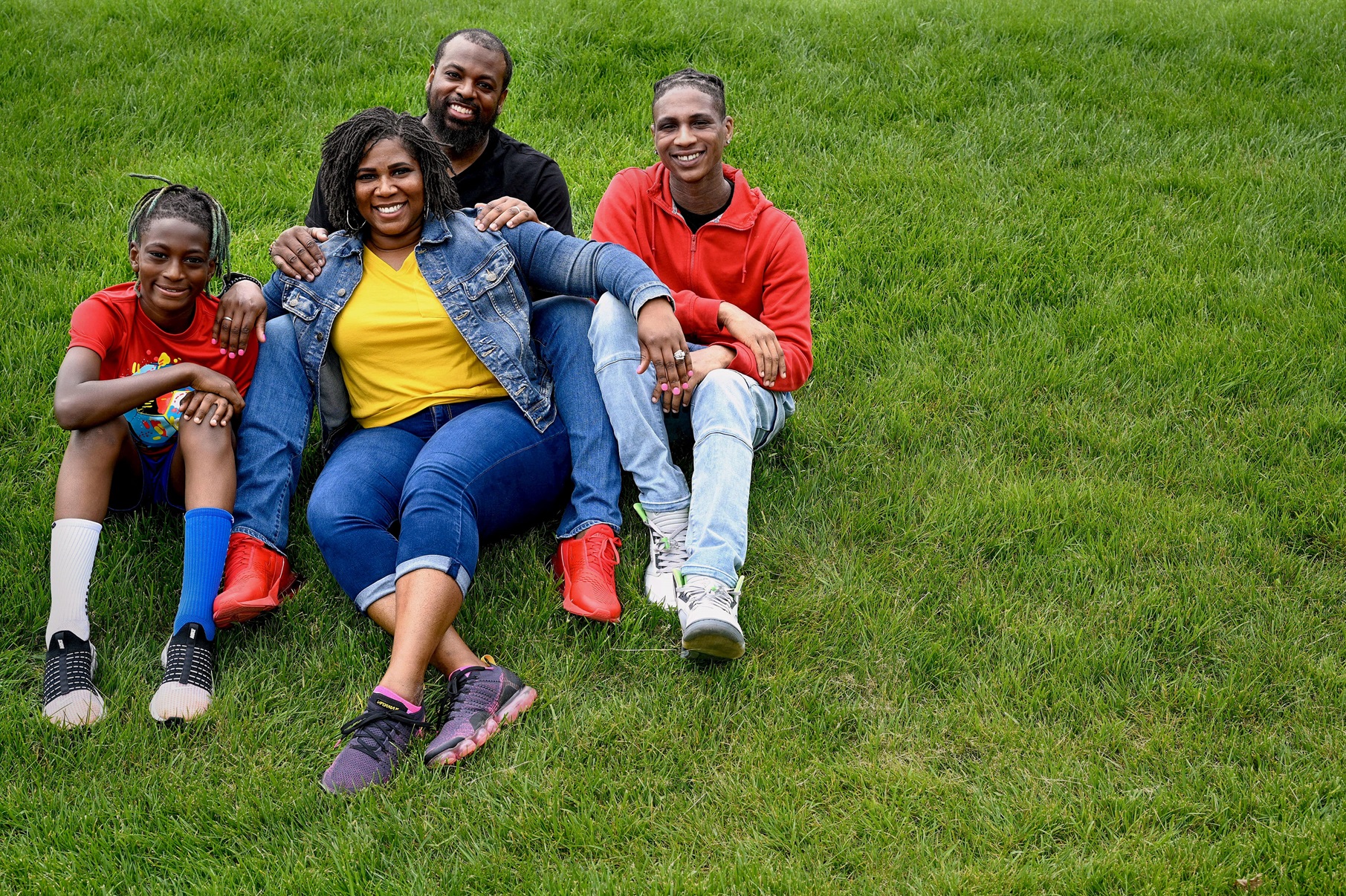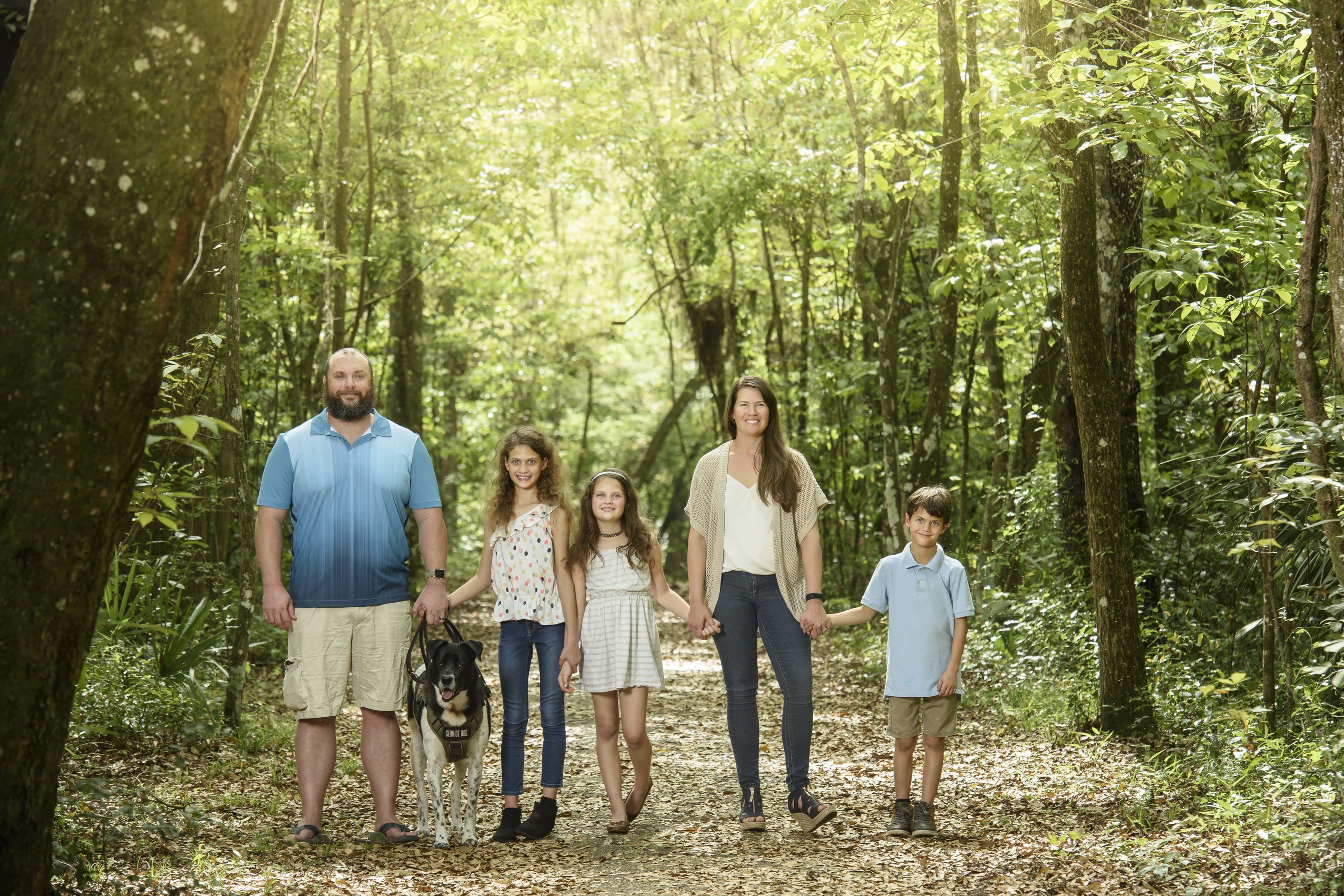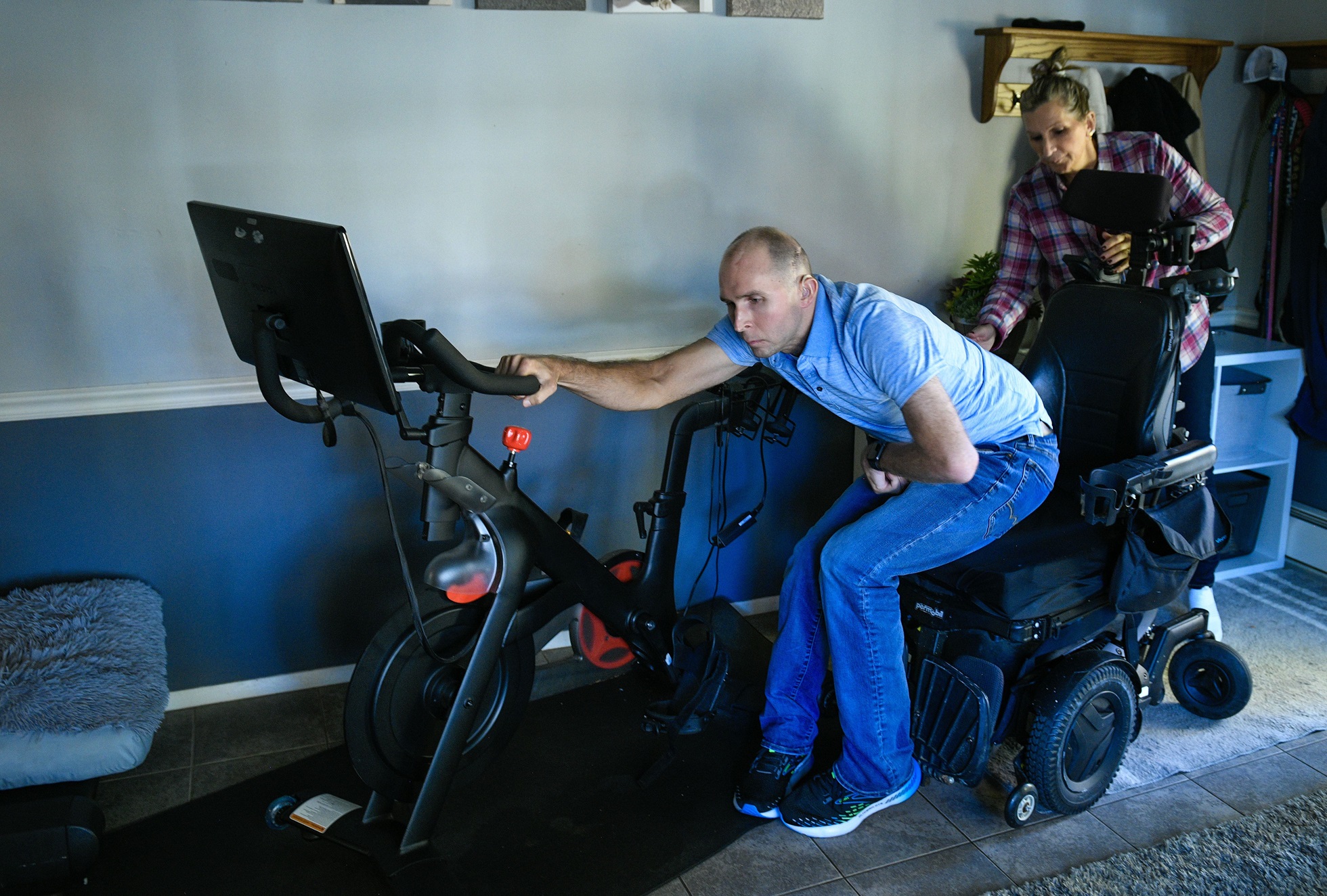Wounded Warrior Project and Community Partners Provide Veteran Caregivers and Families Enhanced Support

Melvin Gatewood, a National Guard veteran and Purple Heart recipient, finds inspiration in his daughter Olivia, as he serves as a WWP peer support group leader.
Wounded Warrior Project® (WWP) understands veteran families’ and caregivers' challenges. In honor of National Caregivers Month, WWP is highlighting caregivers and family members who stand alongside their loved ones, overcoming obstacles and offering unwavering support.
For many warriors, a well-rounded support system includes another person’s aid and assistance for daily activities and tasks due to the nature of their injuries – whether physical, mental, or both. Caring for an individual who requires support can often feel like a full-time job, further impacting a caregiver's overall health.
In fact, according to WWP’s Annual Warrior Survey:
• About 3 in 10 (31.2%) WWP warriors need aid and assistance from another person due to service-connected injuries or health problems and need an average of 55 hours of care per week.
• Nearly half of warriors who require aid and assistance (48.2%) report needing 40 hours or more per week.
• Most often, spouses occupy this role for WWP warriors (75.6%).
To better understand military-connected caregivers, WWP and the Military Family Advisory Network (MFAN), one of WWP’s enduring partners, conducted additional research in 2023 identifying needs and gaps in support for caregiving families. The findings suggest this population needs deeper and broader support systems like peer networks, health and well-being services, financial support, and special considerations for caregivers who are also parents. The research also highlights that caregivers were more likely to report loneliness and moderate or poor family health than those who are not caregivers.
Caregiving can be a family affair, with spouses, siblings, children, youth, and young adults caring for a wounded warrior. WWP’s caregiver support ranges from benefits assistance to programs like the Independence Program, advocacy on Capitol Hill, research, and partnerships with other veterans service organizations.
Click here to learn about WWP's family support programs.
Partnerships to Enhance Family Resiliency
WWP is committed to serving wounded veterans and supporting military families. However, no single organization can meet these needs alone. As the co-chair of the Hidden Helpers Coalition, WWP and the Elizabeth Dole Foundation have pledged to lead the effort, alongside 80-plus organizations, to improve the quality of programming and support for children and youth caregivers of service members. Since 2018, WWP has awarded nearly $4 million to 12 organizations in support of research and programming for Hidden Helpers and their families.

As a woman warrior, Taniki Richard uses the support of her family and WWP to continue moving towards a better future.
Additionally, WWP invests in the following veterans service organizations, adding to its programs and services to build a collaborative support network empowering caregivers and building family resiliency amongst military families.
Learn more about WWP's community partnerships.
1. American Red Cross –The American Red Cross helps members of the military, veterans, and their families prepare for, cope with, and respond to military service challenges. WWP supports their Hidden Helpers Resiliency Workshops that provide easy-to-use skills that encourage positive reconnections among family members and the successful re-engagement of the service member in civilian life.
2. Armed Services YMCA – The Armed Services YMCA enhances the lives of military members and their families in spirit, mind, and body through programs relevant to the unique challenges of military life. WWP proudly invests in their Operation Hero After-School Program, which provides military children and youth caregivers with skills that help them develop a positive self-image and peer connection, as well as manage conflict. WWP also supports the Armed Services YMCA of AK, empowering military families in Alaska by ensuring access to resources, relationships, and opportunities to learn, grow, and thrive.
3. Cohen Veterans Network – Cohen Veterans Network is a national not-for-profit network of 24 mental health clinics for post-9/11 veterans, service members, and military families, providing accessible, high-quality care. WWP’s support helps post-9/11 caregiver children and youth access high-quality behavioral health care and increases resources available to better educate clinicians about supporting this population.
4. Cohen Military Family Clinic at Alaska Behavioral Health – Cohen Military Family Clinic at Alaska Behavioral Health provides behavioral healthcare services and local resource connections to post-9/11 veterans (including National Guard and Reserves), their families, active-duty service members, and the families of active-duty service members in the state. WWP’s grant provides clinician support for case management, therapeutic services, psychoeducational training, and referrals for veterans, service members, and their families.

Wounded Warrior Project helped Jenna find the family support and resources she needed to have a better quality of life for herself, her husband, and her children.
5. Camp Corral – Camp Corral’s mission is to transform the lives of children of wounded, ill, and fallen military heroes by providing camp, advocacy, and enrichment programs. WWP proudly supports one-week residential camp programming for post-9/11 children across 20 nationwide locations.
6. Comfort Crew – Comfort Crew’s mission is to deliver proven strategies to prepare every military child for the unique challenges they face so they positively impact themselves, their families, and our country. WWP’s grant supports four specialized resource kits addressing specific challenges and transitions associated with growing up in a military family: being separated due to deployments, reconnecting after a time of separation, having a parent return with a visible and/or invisible injury, or experiencing grief over the loss of a family member.
7. Elizabeth Dole Foundation & Hidden Hereos – The Elizabeth Dole Foundation strengthens and empowers America’s military caregivers and their families by raising public awareness, driving research, championing policy, and leading collaborations that significantly impact their lives. In addition to co-chairing the Hidden Helpers Coalition, WWP supports a follow-up study to the 2014 Hidden Heroes. America's Military Caregivers study, which WWP also funded. This new research will review the changes in the veteran caregiver ecosystem over the last decade, while enabling a deeper understanding of emerging issues facing the caregiver community and illustrate how this community is predicted to change over the coming years.
8. Military Child Education Coalition – Military Child Education Coalition ensures inclusive, quality educational opportunities for all military-connected children affected by mobility, transition, deployments, and family separation. WWP’s funding supports the development of e-learning modules for school professionals to better understand the experiences of children and youth in caregiving homes. Additionally, high school students from military caregiving homes receive scholarship support for attending summer Student Leadership Programs.
9. Military Family Advisory Network – MFAN provides an authentic voice of the modern military family and the bridge that connects military families to the resources, people, and information they depend on to successfully navigate all phases of military life. WWP funding has supported caregivers at all stages of life, including research exploring the quality of life of caregiving families and the ongoing development of an impact framework for children and youth caregivers as part of furthering the Hidden Helpers Coalition’s work. Additionally, current support includes the implementation of MFAN’s programming survey.

Lisa, a devoted caregiver to her son, embraces each day alongside Josh, who has made remarkable progress in living with his visible and invisible wounds.
10. National Military Family Association – National Military Family Association is on a mission to stand up for, support, and enhance the quality of life for every military family through bold advocacy, innovative programming, and dynamic and responsive solutions. WWP funding provides a camp experience for post-9/11 military children through Operation Purple Camps, helping build military youth well-being through embedded and explicit skill building in essential areas of independence, problem-solving, and fostering teamwork and connection.
11. Our Military Kids – Our Military Kids supports children of deployed National Guard and Reserve service members and those of wounded, ill, and injured veterans from all service branches. Scholarships funded by WWP provide up to $300 for a chosen activity, helping military children cope with stress and anxiety and fostering self-confidence while their parents are deployed or recovering. The Combat Injured Program, supported by WWP, provides extracurricular activity grants for caregiving children and youth of post-9/11 combat-wounded service members.
12. Rosalynn Carter Institute for Caregivers – The Rosalynn Carter Institute promotes the health, strength, and resilience of family caregivers by building cross-sector partnerships, leading research projects and strategic initiatives, developing and implementing evidence-based programs, and advocating for public policy. WWP supports the development of a four-part webinar series focused on military caregiving issues and real-world solutions. These webinars will be based on feedback from caregivers on common and ongoing areas of need.
13. Sesame Workshop – Sesame Workshop is a global impact nonprofit helping children grow smarter, stronger, and kinder. Focusing on young children, Sesame Workshop is on screens, in classrooms, in communities — everywhere families can use a trusted hand to help little ones reach their full potential. WWP’s grant supports Sesame Workshop’s development of a new set of free digital resources in English and Spanish to support the emotional well-being of young children (ages 2-8) and their families within post-9/11 military and veteran caregiving households.
14. Vail Veterans Program – Vail Veterans Program’s mission is to provide service members with physical and/or invisible injuries and their families with innovative and transformational programs that build confidence and improve lives. Program support funds the Summer Family Program, Military Caregiver Retreat, and Military Caregiver Reunion program.
Since 2012, WWP has invested more than $343 million in 212 organizations that help wounded veterans and families across the country. Together, WWP and its community partners connect warriors and their loved ones with the resources they need to improve their quality of life.
Contact: — Krissty Little, Public Relations, klittle@woundedwarriorproject.org, 904.760.6957
About Wounded Warrior Project
Since 2003, Wounded Warrior Project® (WWP) has been meeting the growing needs of warriors, their families, and caregivers — helping them achieve their highest ambition. Learn more.